Analysis of Contract Law Issues: HI6027 Case Study Assignment
VerifiedAdded on 2022/11/29
|7
|1475
|422
Case Study
AI Summary
This document presents a case study analysis of contract law, focusing on the legal principles of offer, acceptance, and revocation within a business context. The assignment examines a scenario involving SOO Burgers and a promotional competition offering a Mazda car. The student analyzes two distinct scenarios: one where a customer, Mickey, attempts to claim the car after collecting tokens, and another where Brett attempts to claim the car by collecting tokens from rubbish bins. The analysis applies relevant legal rules and case law, including Australian Woollen Mills Pty Ltd v The Commonwealth, Carlill v Carbolic Smoke Ball Company, and Routledge v Grant, to determine the validity of the offer and acceptance, and whether the offer was effectively revoked. The conclusion of the analysis is that Mickey cannot claim the car due to successful revocation of the offer, while Brett's claim is also invalid as he did not comply with the terms of the offer. The document includes a bibliography of cited cases.
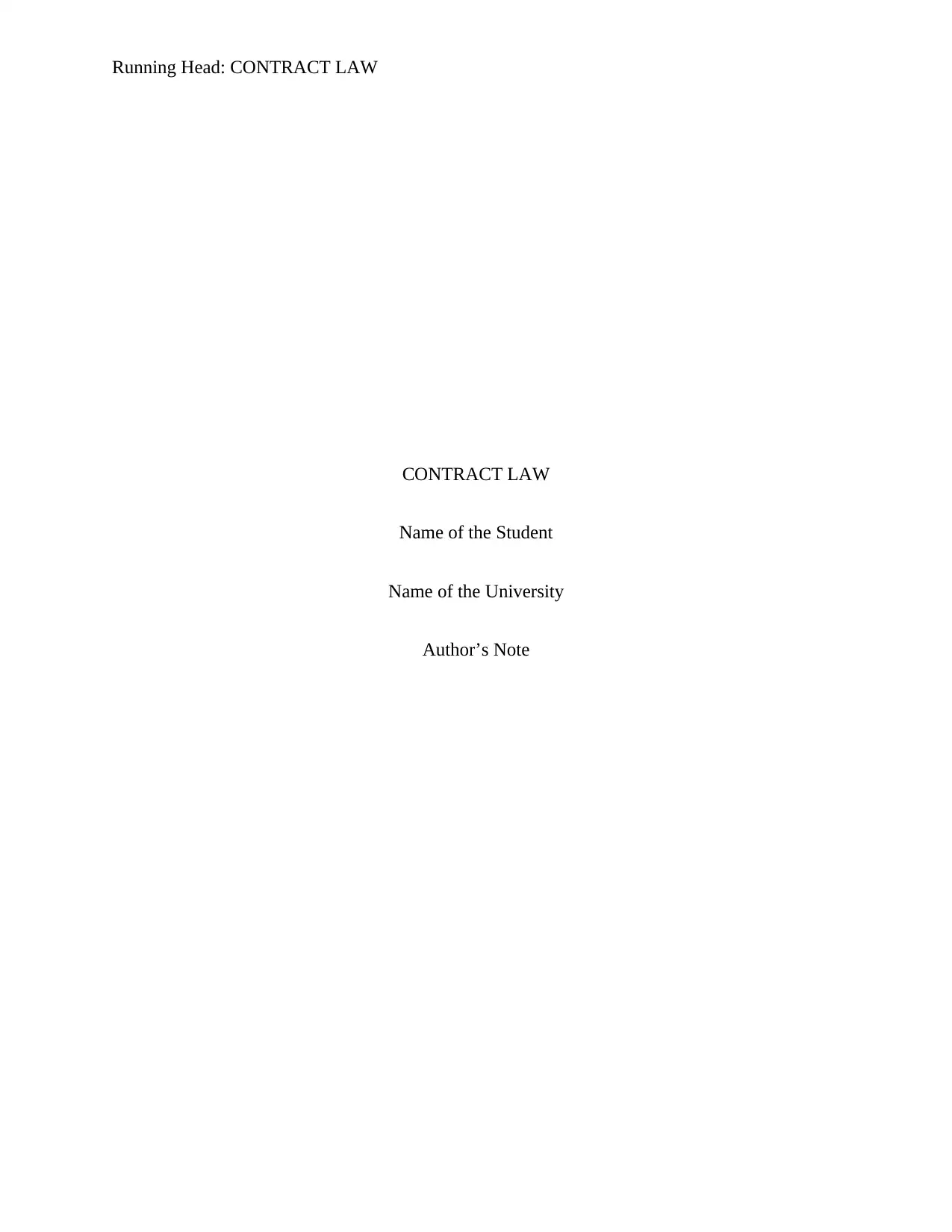
Running Head: CONTRACT LAW
CONTRACT LAW
Name of the Student
Name of the University
Author’s Note
CONTRACT LAW
Name of the Student
Name of the University
Author’s Note
Paraphrase This Document
Need a fresh take? Get an instant paraphrase of this document with our AI Paraphraser
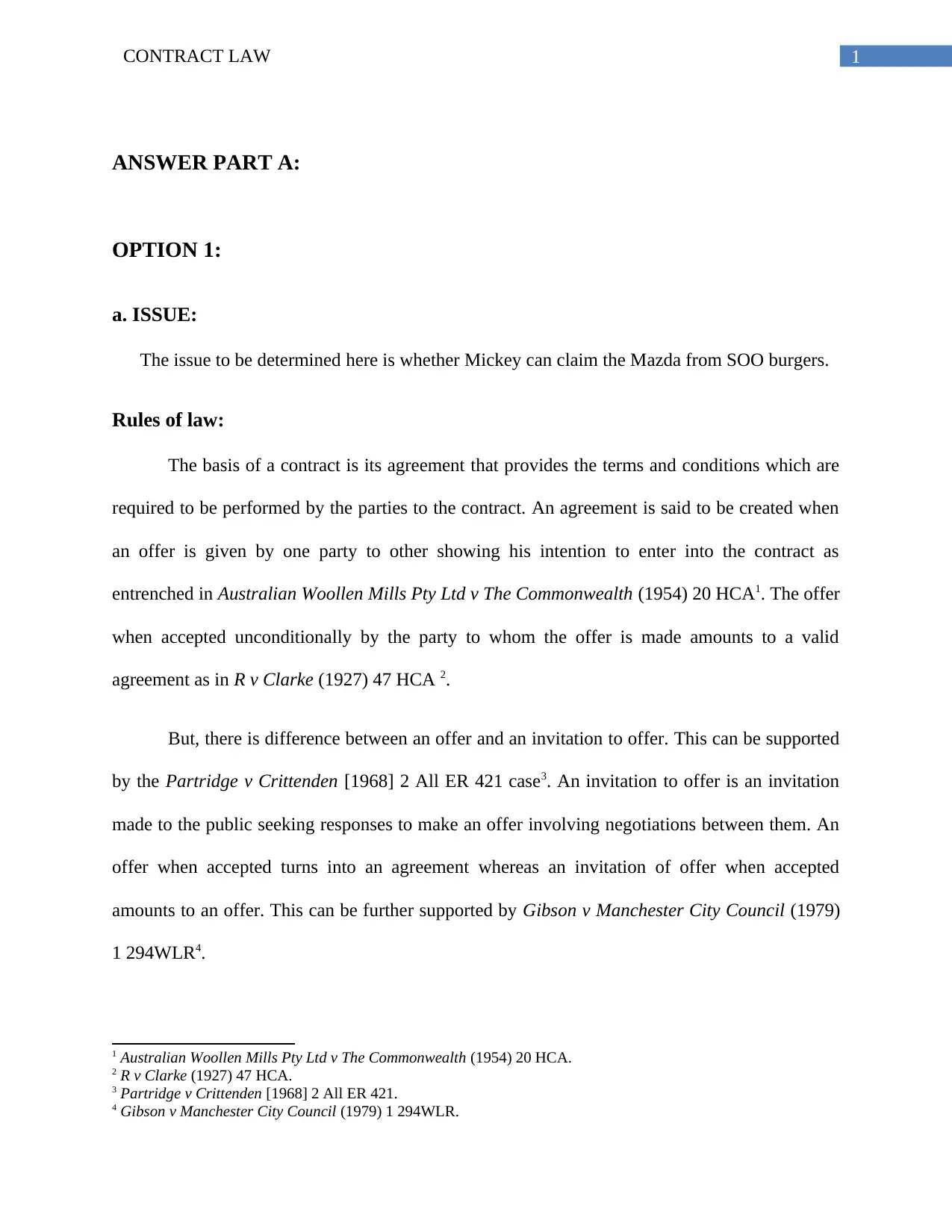
1CONTRACT LAW
ANSWER PART A:
OPTION 1:
a. ISSUE:
The issue to be determined here is whether Mickey can claim the Mazda from SOO burgers.
Rules of law:
The basis of a contract is its agreement that provides the terms and conditions which are
required to be performed by the parties to the contract. An agreement is said to be created when
an offer is given by one party to other showing his intention to enter into the contract as
entrenched in Australian Woollen Mills Pty Ltd v The Commonwealth (1954) 20 HCA1. The offer
when accepted unconditionally by the party to whom the offer is made amounts to a valid
agreement as in R v Clarke (1927) 47 HCA 2.
But, there is difference between an offer and an invitation to offer. This can be supported
by the Partridge v Crittenden [1968] 2 All ER 421 case3. An invitation to offer is an invitation
made to the public seeking responses to make an offer involving negotiations between them. An
offer when accepted turns into an agreement whereas an invitation of offer when accepted
amounts to an offer. This can be further supported by Gibson v Manchester City Council (1979)
1 294WLR4.
1 Australian Woollen Mills Pty Ltd v The Commonwealth (1954) 20 HCA.
2 R v Clarke (1927) 47 HCA.
3 Partridge v Crittenden [1968] 2 All ER 421.
4 Gibson v Manchester City Council (1979) 1 294WLR.
ANSWER PART A:
OPTION 1:
a. ISSUE:
The issue to be determined here is whether Mickey can claim the Mazda from SOO burgers.
Rules of law:
The basis of a contract is its agreement that provides the terms and conditions which are
required to be performed by the parties to the contract. An agreement is said to be created when
an offer is given by one party to other showing his intention to enter into the contract as
entrenched in Australian Woollen Mills Pty Ltd v The Commonwealth (1954) 20 HCA1. The offer
when accepted unconditionally by the party to whom the offer is made amounts to a valid
agreement as in R v Clarke (1927) 47 HCA 2.
But, there is difference between an offer and an invitation to offer. This can be supported
by the Partridge v Crittenden [1968] 2 All ER 421 case3. An invitation to offer is an invitation
made to the public seeking responses to make an offer involving negotiations between them. An
offer when accepted turns into an agreement whereas an invitation of offer when accepted
amounts to an offer. This can be further supported by Gibson v Manchester City Council (1979)
1 294WLR4.
1 Australian Woollen Mills Pty Ltd v The Commonwealth (1954) 20 HCA.
2 R v Clarke (1927) 47 HCA.
3 Partridge v Crittenden [1968] 2 All ER 421.
4 Gibson v Manchester City Council (1979) 1 294WLR.
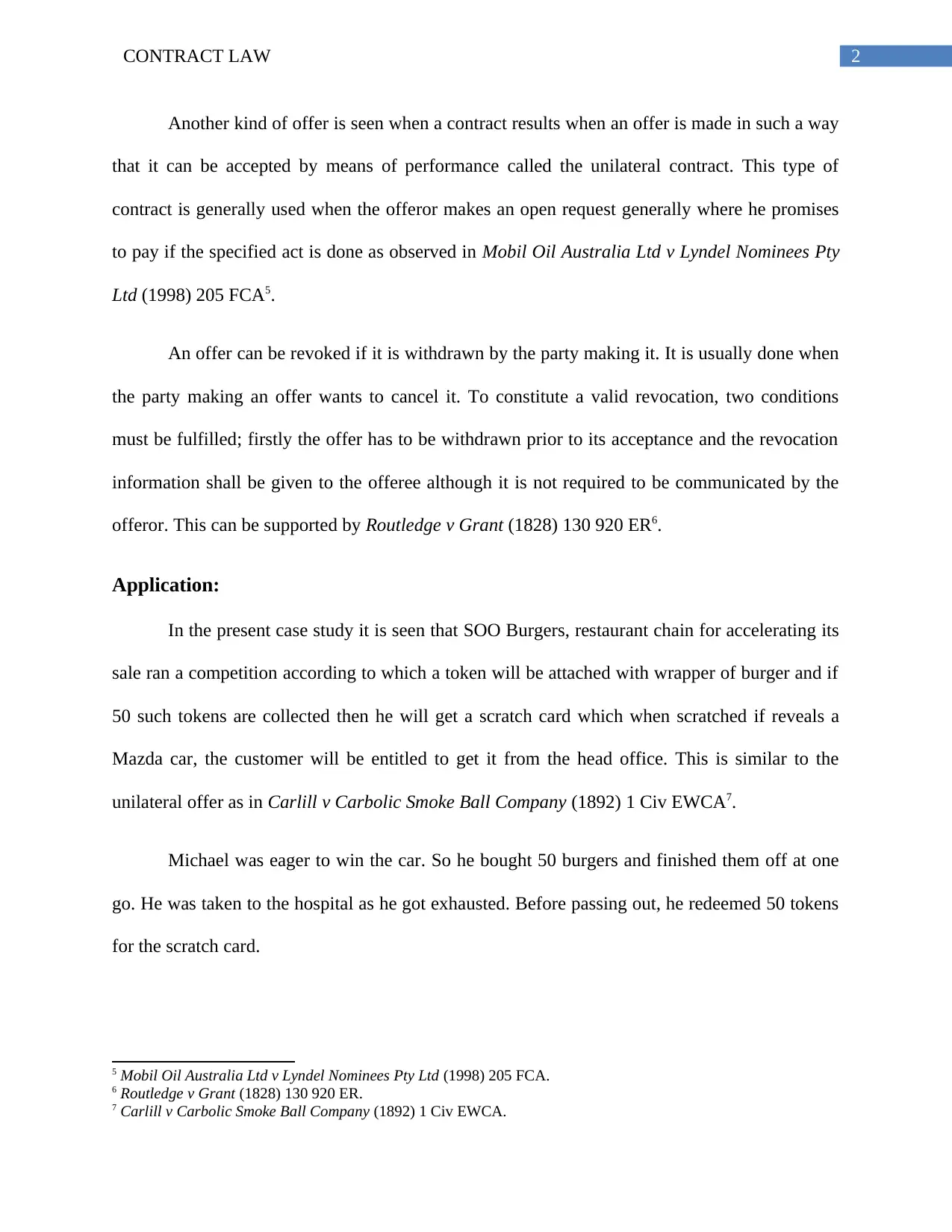
2CONTRACT LAW
Another kind of offer is seen when a contract results when an offer is made in such a way
that it can be accepted by means of performance called the unilateral contract. This type of
contract is generally used when the offeror makes an open request generally where he promises
to pay if the specified act is done as observed in Mobil Oil Australia Ltd v Lyndel Nominees Pty
Ltd (1998) 205 FCA5.
An offer can be revoked if it is withdrawn by the party making it. It is usually done when
the party making an offer wants to cancel it. To constitute a valid revocation, two conditions
must be fulfilled; firstly the offer has to be withdrawn prior to its acceptance and the revocation
information shall be given to the offeree although it is not required to be communicated by the
offeror. This can be supported by Routledge v Grant (1828) 130 920 ER6.
Application:
In the present case study it is seen that SOO Burgers, restaurant chain for accelerating its
sale ran a competition according to which a token will be attached with wrapper of burger and if
50 such tokens are collected then he will get a scratch card which when scratched if reveals a
Mazda car, the customer will be entitled to get it from the head office. This is similar to the
unilateral offer as in Carlill v Carbolic Smoke Ball Company (1892) 1 Civ EWCA7.
Michael was eager to win the car. So he bought 50 burgers and finished them off at one
go. He was taken to the hospital as he got exhausted. Before passing out, he redeemed 50 tokens
for the scratch card.
5 Mobil Oil Australia Ltd v Lyndel Nominees Pty Ltd (1998) 205 FCA.
6 Routledge v Grant (1828) 130 920 ER.
7 Carlill v Carbolic Smoke Ball Company (1892) 1 Civ EWCA.
Another kind of offer is seen when a contract results when an offer is made in such a way
that it can be accepted by means of performance called the unilateral contract. This type of
contract is generally used when the offeror makes an open request generally where he promises
to pay if the specified act is done as observed in Mobil Oil Australia Ltd v Lyndel Nominees Pty
Ltd (1998) 205 FCA5.
An offer can be revoked if it is withdrawn by the party making it. It is usually done when
the party making an offer wants to cancel it. To constitute a valid revocation, two conditions
must be fulfilled; firstly the offer has to be withdrawn prior to its acceptance and the revocation
information shall be given to the offeree although it is not required to be communicated by the
offeror. This can be supported by Routledge v Grant (1828) 130 920 ER6.
Application:
In the present case study it is seen that SOO Burgers, restaurant chain for accelerating its
sale ran a competition according to which a token will be attached with wrapper of burger and if
50 such tokens are collected then he will get a scratch card which when scratched if reveals a
Mazda car, the customer will be entitled to get it from the head office. This is similar to the
unilateral offer as in Carlill v Carbolic Smoke Ball Company (1892) 1 Civ EWCA7.
Michael was eager to win the car. So he bought 50 burgers and finished them off at one
go. He was taken to the hospital as he got exhausted. Before passing out, he redeemed 50 tokens
for the scratch card.
5 Mobil Oil Australia Ltd v Lyndel Nominees Pty Ltd (1998) 205 FCA.
6 Routledge v Grant (1828) 130 920 ER.
7 Carlill v Carbolic Smoke Ball Company (1892) 1 Civ EWCA.
⊘ This is a preview!⊘
Do you want full access?
Subscribe today to unlock all pages.

Trusted by 1+ million students worldwide
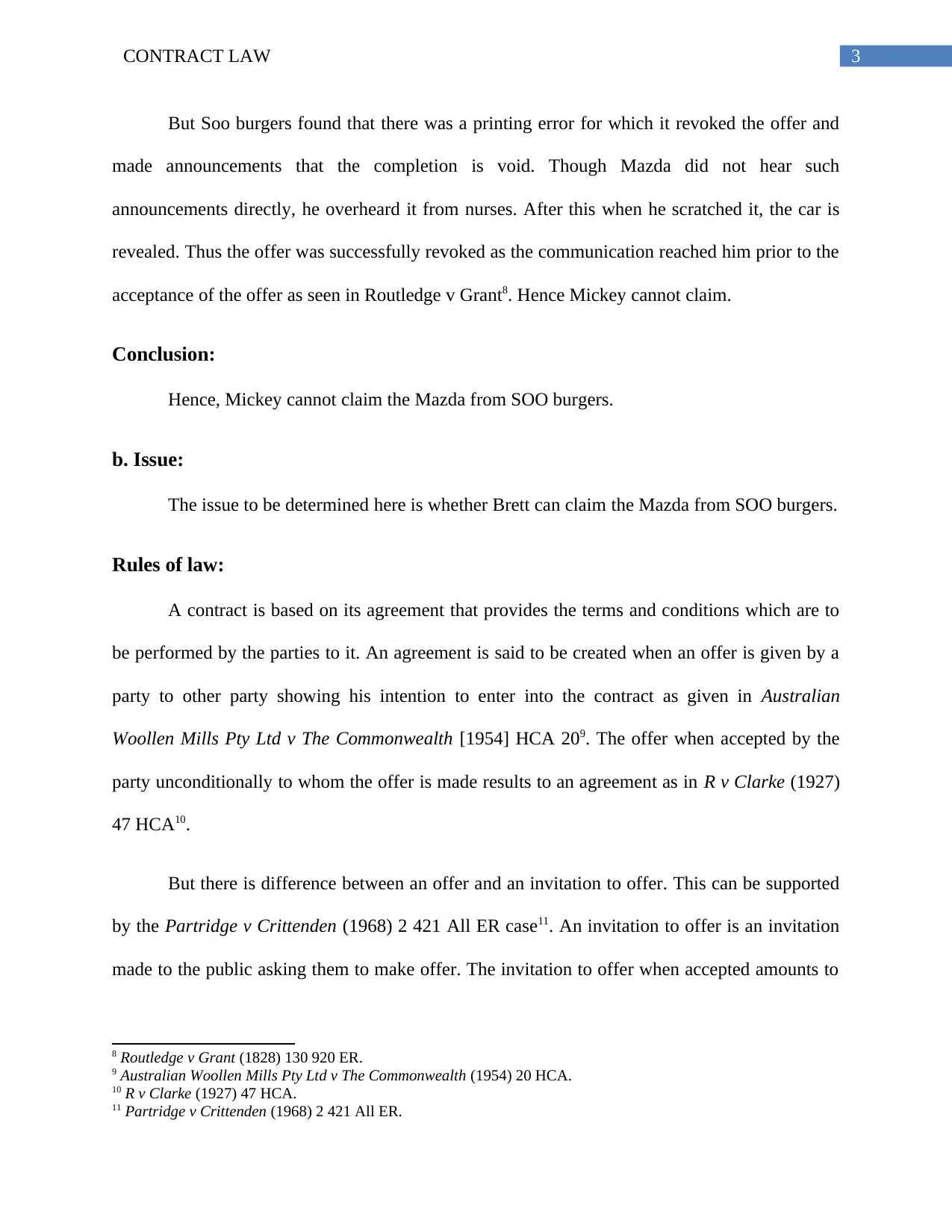
3CONTRACT LAW
But Soo burgers found that there was a printing error for which it revoked the offer and
made announcements that the completion is void. Though Mazda did not hear such
announcements directly, he overheard it from nurses. After this when he scratched it, the car is
revealed. Thus the offer was successfully revoked as the communication reached him prior to the
acceptance of the offer as seen in Routledge v Grant8. Hence Mickey cannot claim.
Conclusion:
Hence, Mickey cannot claim the Mazda from SOO burgers.
b. Issue:
The issue to be determined here is whether Brett can claim the Mazda from SOO burgers.
Rules of law:
A contract is based on its agreement that provides the terms and conditions which are to
be performed by the parties to it. An agreement is said to be created when an offer is given by a
party to other party showing his intention to enter into the contract as given in Australian
Woollen Mills Pty Ltd v The Commonwealth [1954] HCA 209. The offer when accepted by the
party unconditionally to whom the offer is made results to an agreement as in R v Clarke (1927)
47 HCA10.
But there is difference between an offer and an invitation to offer. This can be supported
by the Partridge v Crittenden (1968) 2 421 All ER case11. An invitation to offer is an invitation
made to the public asking them to make offer. The invitation to offer when accepted amounts to
8 Routledge v Grant (1828) 130 920 ER.
9 Australian Woollen Mills Pty Ltd v The Commonwealth (1954) 20 HCA.
10 R v Clarke (1927) 47 HCA.
11 Partridge v Crittenden (1968) 2 421 All ER.
But Soo burgers found that there was a printing error for which it revoked the offer and
made announcements that the completion is void. Though Mazda did not hear such
announcements directly, he overheard it from nurses. After this when he scratched it, the car is
revealed. Thus the offer was successfully revoked as the communication reached him prior to the
acceptance of the offer as seen in Routledge v Grant8. Hence Mickey cannot claim.
Conclusion:
Hence, Mickey cannot claim the Mazda from SOO burgers.
b. Issue:
The issue to be determined here is whether Brett can claim the Mazda from SOO burgers.
Rules of law:
A contract is based on its agreement that provides the terms and conditions which are to
be performed by the parties to it. An agreement is said to be created when an offer is given by a
party to other party showing his intention to enter into the contract as given in Australian
Woollen Mills Pty Ltd v The Commonwealth [1954] HCA 209. The offer when accepted by the
party unconditionally to whom the offer is made results to an agreement as in R v Clarke (1927)
47 HCA10.
But there is difference between an offer and an invitation to offer. This can be supported
by the Partridge v Crittenden (1968) 2 421 All ER case11. An invitation to offer is an invitation
made to the public asking them to make offer. The invitation to offer when accepted amounts to
8 Routledge v Grant (1828) 130 920 ER.
9 Australian Woollen Mills Pty Ltd v The Commonwealth (1954) 20 HCA.
10 R v Clarke (1927) 47 HCA.
11 Partridge v Crittenden (1968) 2 421 All ER.
Paraphrase This Document
Need a fresh take? Get an instant paraphrase of this document with our AI Paraphraser
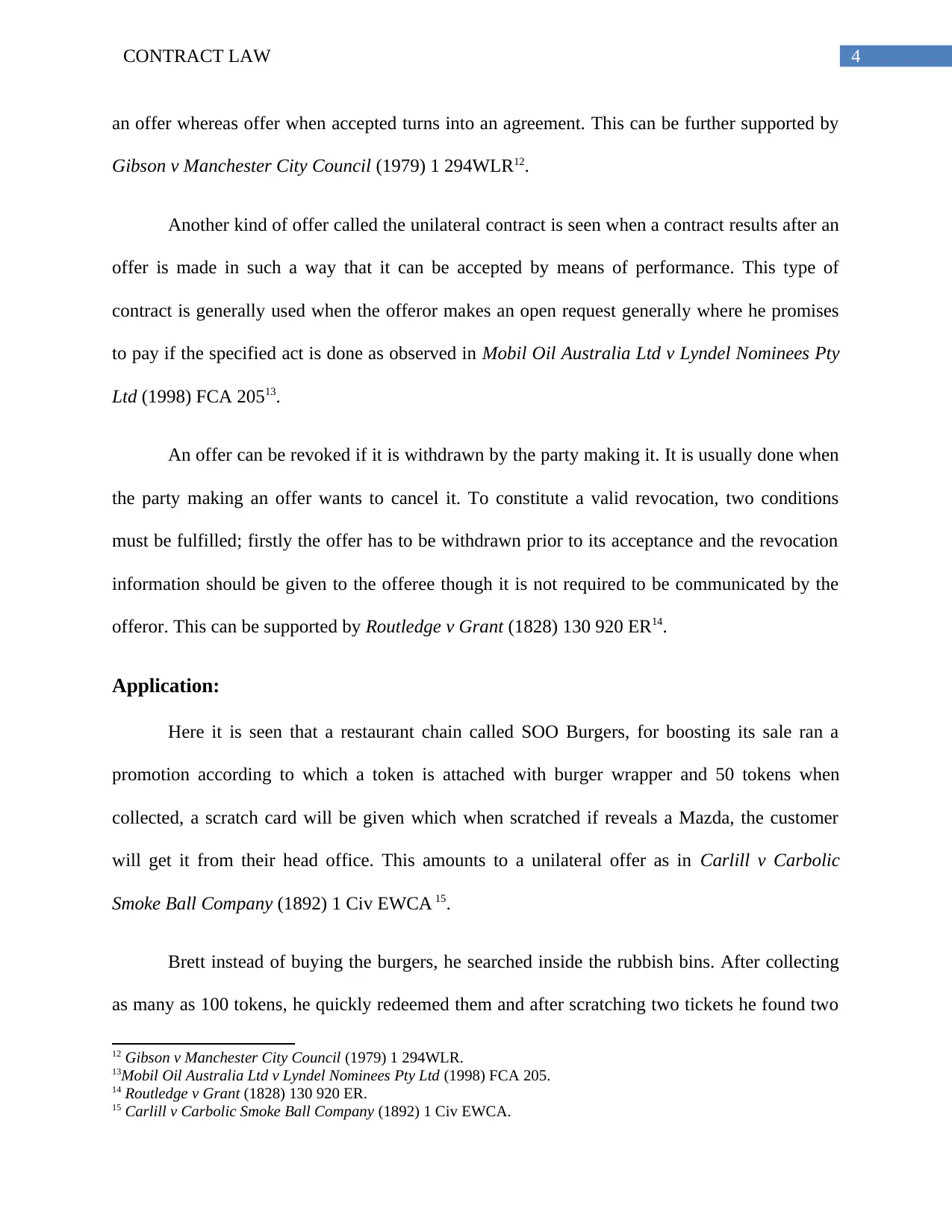
4CONTRACT LAW
an offer whereas offer when accepted turns into an agreement. This can be further supported by
Gibson v Manchester City Council (1979) 1 294WLR12.
Another kind of offer called the unilateral contract is seen when a contract results after an
offer is made in such a way that it can be accepted by means of performance. This type of
contract is generally used when the offeror makes an open request generally where he promises
to pay if the specified act is done as observed in Mobil Oil Australia Ltd v Lyndel Nominees Pty
Ltd (1998) FCA 20513.
An offer can be revoked if it is withdrawn by the party making it. It is usually done when
the party making an offer wants to cancel it. To constitute a valid revocation, two conditions
must be fulfilled; firstly the offer has to be withdrawn prior to its acceptance and the revocation
information should be given to the offeree though it is not required to be communicated by the
offeror. This can be supported by Routledge v Grant (1828) 130 920 ER14.
Application:
Here it is seen that a restaurant chain called SOO Burgers, for boosting its sale ran a
promotion according to which a token is attached with burger wrapper and 50 tokens when
collected, a scratch card will be given which when scratched if reveals a Mazda, the customer
will get it from their head office. This amounts to a unilateral offer as in Carlill v Carbolic
Smoke Ball Company (1892) 1 Civ EWCA 15.
Brett instead of buying the burgers, he searched inside the rubbish bins. After collecting
as many as 100 tokens, he quickly redeemed them and after scratching two tickets he found two
12 Gibson v Manchester City Council (1979) 1 294WLR.
13Mobil Oil Australia Ltd v Lyndel Nominees Pty Ltd (1998) FCA 205.
14 Routledge v Grant (1828) 130 920 ER.
15 Carlill v Carbolic Smoke Ball Company (1892) 1 Civ EWCA.
an offer whereas offer when accepted turns into an agreement. This can be further supported by
Gibson v Manchester City Council (1979) 1 294WLR12.
Another kind of offer called the unilateral contract is seen when a contract results after an
offer is made in such a way that it can be accepted by means of performance. This type of
contract is generally used when the offeror makes an open request generally where he promises
to pay if the specified act is done as observed in Mobil Oil Australia Ltd v Lyndel Nominees Pty
Ltd (1998) FCA 20513.
An offer can be revoked if it is withdrawn by the party making it. It is usually done when
the party making an offer wants to cancel it. To constitute a valid revocation, two conditions
must be fulfilled; firstly the offer has to be withdrawn prior to its acceptance and the revocation
information should be given to the offeree though it is not required to be communicated by the
offeror. This can be supported by Routledge v Grant (1828) 130 920 ER14.
Application:
Here it is seen that a restaurant chain called SOO Burgers, for boosting its sale ran a
promotion according to which a token is attached with burger wrapper and 50 tokens when
collected, a scratch card will be given which when scratched if reveals a Mazda, the customer
will get it from their head office. This amounts to a unilateral offer as in Carlill v Carbolic
Smoke Ball Company (1892) 1 Civ EWCA 15.
Brett instead of buying the burgers, he searched inside the rubbish bins. After collecting
as many as 100 tokens, he quickly redeemed them and after scratching two tickets he found two
12 Gibson v Manchester City Council (1979) 1 294WLR.
13Mobil Oil Australia Ltd v Lyndel Nominees Pty Ltd (1998) FCA 205.
14 Routledge v Grant (1828) 130 920 ER.
15 Carlill v Carbolic Smoke Ball Company (1892) 1 Civ EWCA.
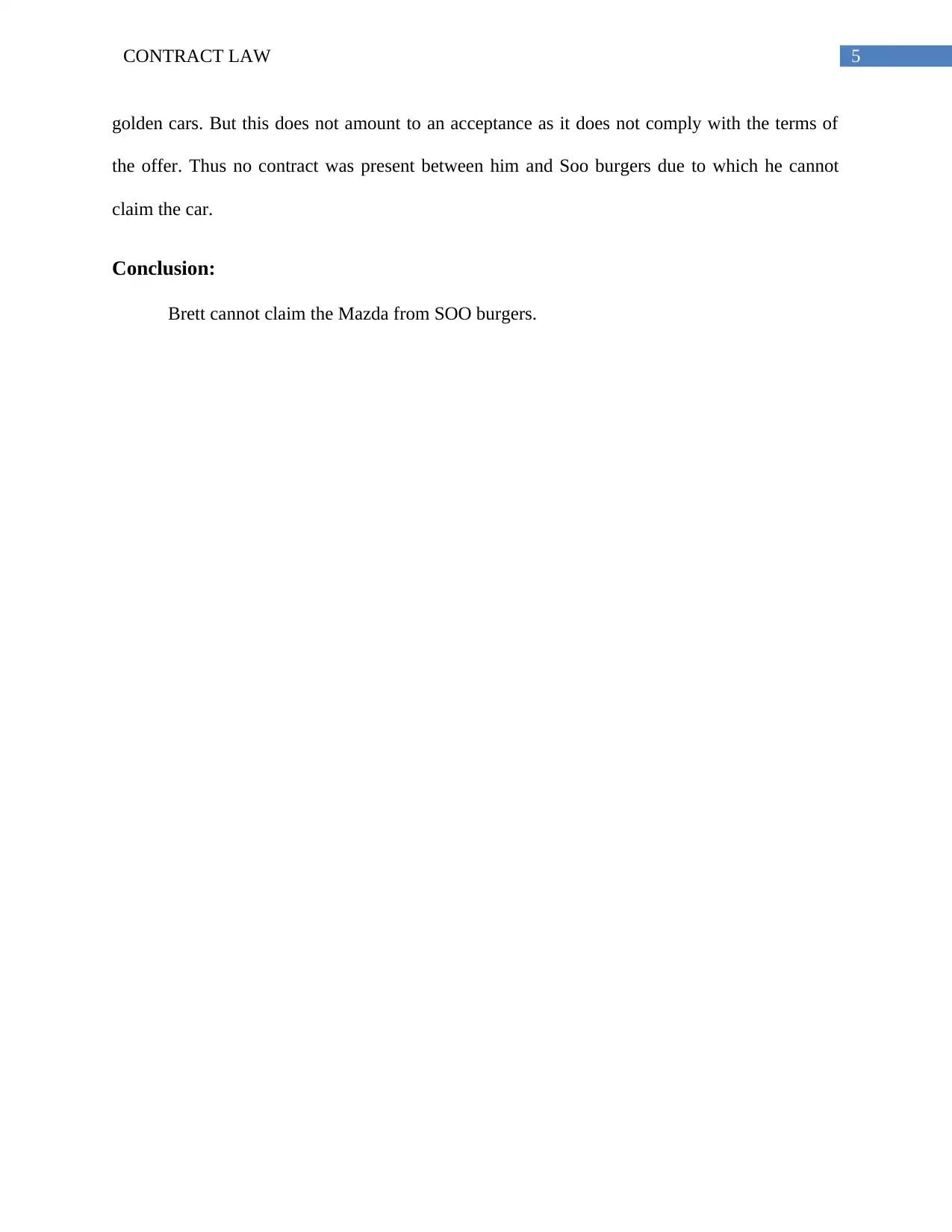
5CONTRACT LAW
golden cars. But this does not amount to an acceptance as it does not comply with the terms of
the offer. Thus no contract was present between him and Soo burgers due to which he cannot
claim the car.
Conclusion:
Brett cannot claim the Mazda from SOO burgers.
golden cars. But this does not amount to an acceptance as it does not comply with the terms of
the offer. Thus no contract was present between him and Soo burgers due to which he cannot
claim the car.
Conclusion:
Brett cannot claim the Mazda from SOO burgers.
⊘ This is a preview!⊘
Do you want full access?
Subscribe today to unlock all pages.

Trusted by 1+ million students worldwide
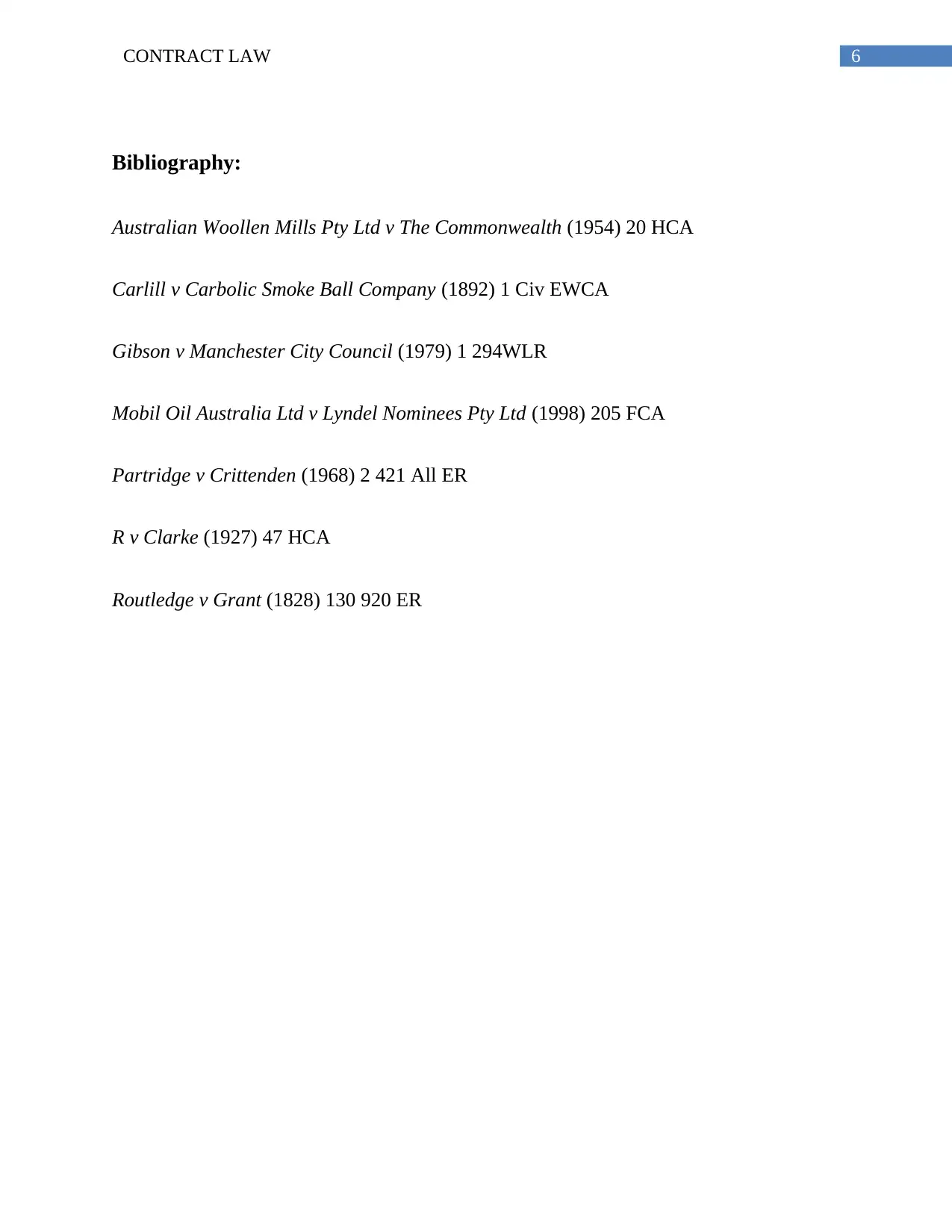
6CONTRACT LAW
Bibliography:
Australian Woollen Mills Pty Ltd v The Commonwealth (1954) 20 HCA
Carlill v Carbolic Smoke Ball Company (1892) 1 Civ EWCA
Gibson v Manchester City Council (1979) 1 294WLR
Mobil Oil Australia Ltd v Lyndel Nominees Pty Ltd (1998) 205 FCA
Partridge v Crittenden (1968) 2 421 All ER
R v Clarke (1927) 47 HCA
Routledge v Grant (1828) 130 920 ER
Bibliography:
Australian Woollen Mills Pty Ltd v The Commonwealth (1954) 20 HCA
Carlill v Carbolic Smoke Ball Company (1892) 1 Civ EWCA
Gibson v Manchester City Council (1979) 1 294WLR
Mobil Oil Australia Ltd v Lyndel Nominees Pty Ltd (1998) 205 FCA
Partridge v Crittenden (1968) 2 421 All ER
R v Clarke (1927) 47 HCA
Routledge v Grant (1828) 130 920 ER
1 out of 7
Related Documents
Your All-in-One AI-Powered Toolkit for Academic Success.
+13062052269
info@desklib.com
Available 24*7 on WhatsApp / Email
![[object Object]](/_next/static/media/star-bottom.7253800d.svg)
Unlock your academic potential
Copyright © 2020–2026 A2Z Services. All Rights Reserved. Developed and managed by ZUCOL.





